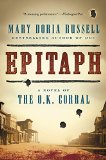Summary | Excerpt | Reviews | Beyond the Book | Readalikes | Genres & Themes | Author Bio

A Novel of the O.K. Corral
by Mary Doria Russell
"And this," he said gently, "is the way my mamma taught me to play it. As though a child were sleepin' in the very next room."
Silent, face still, he cut the tempo in half. His fingers did not so much strike the keys as caress them. Releasing the sound, not demanding it. If she had taken so long between each phrase, it would have been a sign that she simply hadn't practiced. When he played, it
was as though he knew just how long each note should linger in the ear and in the heart.
She had been weepy since the argument with Johnny. The music was so beautiful, and so beautifully performed. She sank back into the chair and began to cry again, though not as noiselessly as she hoped, for the gentleman heard the shuddering sniffle that escaped her.
"Yes, it is more tender when you take your time," he said, as though it were the music alone and not her own self-pity that had brought her to tears. "Mamma loved that piece," he said softly. "My earliest memories of her are at the piano." Then, without warning, he rolled through a dazzling five-octave arpeggio. "I have read about the Chickering grand, but this is the first one I have played. There is a little banjo in the tone," he observed, "but it has a lovely touch. Now, here is something that ought to be done at full gallop!"
He ripped into a sprightly sonata, his fingers dancing, the notes crisp and slyly joyous, as though he were sharing some private joke with the composer. She blew her nose again and began to cheer up. His hair was more ash than blond, but he was not as old as she'd first thought. Maybe only forty, she decided. Not very much older than Johnny Behan.
Johnny was almost thirty-eight, but still youthful and handsome. And, God! Those Irish eyes, those thick dark lashes! Still, the pianist had a good face. It was intelligent and refined, though lined, she thought—schooled in melodrama—by tragedy or suffering.
Having been caught blubbering like a baby, she suddenly felt it imperative to make this man see her as a woman. When he finished the piece, she cleared her throat and pitched her voice low to say with as much authority as an eighteen-year-old could muster, "You're a professional, aren't you!"
He smiled, but his hands never paused. He was playing a waltz now, the melody simple but pretty. "Guilty as charged."
"I knew it! Are you in Tombstone to give a concert?"
"Cards, sugar. I play cards for a livin', not piano."
"Then you're wasting your talent, and that's a crime. Honestly! You could be a concert pianist."
Another small smile. Amused, not flattered. "I am good, but not that good."
"Well, you could play for the theater, at least. I know. I used to dance professionally, and let me tell you—you're better than just good. Of course, my judgment is suspect." She lowered her voice and her eyes. "I can be a fool for a musician."
His hands came off the keyboard, mid-measure, and he turned to look at her, his arched brows lifted high. "Why, Mrs. Behan. Are you flirtin' with me?"
He knew who she was. And from the way he said "Mrs. Behan," he knew what she was as well. Refusing to be ashamed, she manufactured a saucy grin, but the cut in her lip abbreviated the performance. She made her eyes sparkle instead, tilting her head in a way she knew to be provocative and alluring. She had seen it used to good effect by several actresses.
"And what if I am?" she asked, bold as brass.
Several hotel guests had tarried near the door to the lobby, listening to the music. Now that the gentleman had stopped playing, they went on about their business. A few blocks away, a steam whistle shrieked the shift change in Tombstone's silver mines. For a moment, she was freshly aware of the ceaseless industrial noise out beyond Toughnut
Street.
With slow care, the pianist rose and moved toward her, his slate-blue eyes resting steadily on her own. She blinked, uncertain about what she had just set in motion, for he was close now. Reaching toward her chin. Lifting it, studying her face with an unnerving, unwavering gaze. He smelled of soap and of tobacco. There was liquor on his breath, and the faint, sweet odor of decay. She thought that he might bend to kiss her on the lips. She decided that she would let him. Why not? she thought, lowering her lids, letting him come to her. It would serve Johnny right.
From Epitaph by Mary Doria Russell. Copyright 2015 by Mary Doria Russell. Excerpted by permission of Ecco, an imprint of HarperCollins Publishers.
There are two kinds of light - the glow that illuminates, and the glare that obscures.
Click Here to find out who said this, as well as discovering other famous literary quotes!
Your guide toexceptional books
BookBrowse seeks out and recommends the best in contemporary fiction and nonfiction—books that not only engage and entertain but also deepen our understanding of ourselves and the world around us.